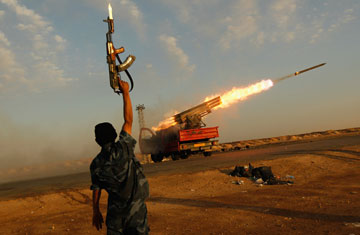
A rebel fighter celebrates as his comrades fire a rocket barrage toward troops loyal to Muammar Gaddafi on April 14, 2011, west of Ajdabiyah, Libya
When Libya's cashed-strapped rebels needed financial support to bankroll their revolution last spring, they did not look to Western powers such as the U.S. and England for aid. Instead they turned to tiny Qatar. The Persian Gulf emirate provided the struggling rebels everything from weapons to heating oil. During the eight-month revolution, Libyans in rebel-held areas praised Qatar. But after the capital of Tripoli fell and the country's leader, Muammar Gaddafi, was killed, Libyans turned on their benefactor, accusing Qatar of a hidden agenda: getting a small faction of Islamists to implement its agenda.
Qatar's role was crucial during the early days of the revolution. It spearheaded the Arab League's effort to urge the U.N. to establish a no-fly zone in Libya. The resolution paved the way for the NATO air campaign that turned the tide of the war and sealed Gaddafi's fate.
Qatar provided the rebels with weapons and supplies they needed to fight the Libyan leader's troops. Early on, the Qataris delivered logistical provisions, ranging from walkie-talkies to Chevrolet SUVs. As it became clear that the rebels were underequipped and no match for Gaddafi's better-outfitted troops, the Qataris sent heavy weaponry like French Milan antitank missiles. The Qataris also trained the rebels, taking hundreds to Doha while sending their officers to Libya to provide battlefield expertise. Today, they are preparing to fund a program to send Libyan troops to train in France.
Qatar did much more than finance weapons purchases and provide battlefield training. With no access to money and facing legal difficulties in selling oil, the rebels' political body — known as the National Transitional Council (NTC) — could not pay Libyan salaries and fund the wide-ranging subsidies on everything from bread to gas, which grease the economy. Qatar stepped in by offering to market 1 million barrels of oil for the NTC, which brought in about $100 million. Later, the small but immensely rich country delivered four consignments of refined petroleum products, such as diesel and gasoline. When international oil firms refused to offload oil shipments in Benghazi's port until the NTC paid for them, Qatar intervened and pledged to do so if the Libyan council could not.
Qatar also helped launch a Libyan satellite channel, Libya al-Ahrar, by providing it office space in Doha and transmitting its signal. The network was established in March to chip away at Gaddafi's support in areas still under his control. After the Arab League instructed Arab satellite providers to stop transmitting Gaddafi's state-run Libyan television on their frequencies in May, many of the country's residents relied on Libya al-Ahrar and its prorebel slant for their news. In explaining that his country's aid was purely altruistic, the Qatari emir said he wanted "to ease the suffering of the Libyan brethren and to meet their humanitarian needs."
But with Gaddafi dead and his regime a distant memory, many Libyans are now complaining that Qatari aid has come at a price. They say Qatar provided a narrow clique of Islamists with arms and money, giving them great leverage over the political process. "I think what they have done is basically support the Muslim Brotherhood," says former NTC Deputy Prime Minister Ali Tarhouni, referring to the Islamist organization that has won elections in Egypt and Tunisia. "They have brought armaments and they have given them to people that we don't know." Some Qatari officials have indeed exerted influence in Libyan politics. During deliberations to choose a new Cabinet in September, a senior Qatari official was seen huddled with the outgoing Defense Minister, allegedly trying to guide appointments to sensitive security positions.
NTC members complain that actions like these are undermining the fragile transition to democracy the NTC has promised. "Qatar is weakening Libya," says an NTC member who requested anonymity because he was speaking about a sensitive topic. "In funding the Islamists, they are upsetting the balance of politics and making it difficult for us to move forward. They need to stop their meddling." Senior military officials sidelined by Qatar's cronies are just as blunt. "If aid comes through the front door, we like Qatar," says General Khalifa Hiftar. "But if it comes through the window to certain people [and] bypassing official channels, we don't want Qatar."
But senior NTC officials scoff at the suggestion that Qatar is unduly influencing Libyan politicians and weakening the new government. "People say Qatar has an agenda. There is no proof of this," says NTC Vice Chairman Abd al-Hafiz Ghoga. "They just had a big role in the revolution."
Average Libyans, however, do not buy Ghoga's argument. Outside the courthouse in Benghazi, where the revolution began on Feb. 15, street peddlers hawk everything from key chains to bracelets emblazoned with the rebels' tricolor flag. For most of the revolution, they did a brisk trade in Qatari flags. But with the town abuzz about Qatar's meddling in Libyan affairs, vendors like Abdallah Mahmud have stopped selling Qatari products. "We fought to be free," he explained, "not so that new rulers from abroad will take away our freedom." It was a refrain seldom heard during the revolution. But with Libyan politicians taking an increasingly vocal stance against Qatar, the tiny Gulf emirate whose friendship Libya was proud of has become an obtrusive guest that many wish would leave.
